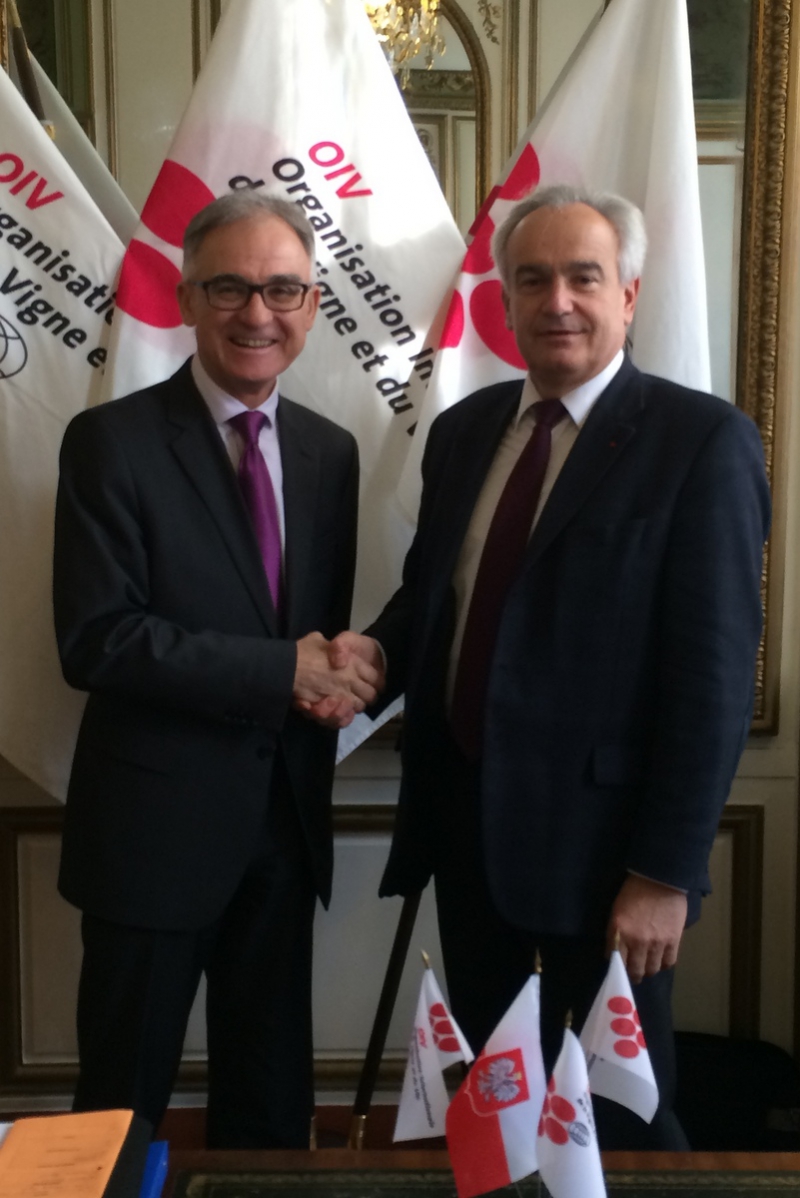
Since the accession of Lebanon in 1996, Serge Hochar played a major role in the renovation and development of the Lebanese vitivinicultural sector, working closely with the OIV.
Head of the Lebanese OIV delegation for around fifteen years, he was also one of the architects of Lebanon's wine legislation established in 2000, Founder and President of the Union Vinicole du Liban and, more recently, President of the National Institute of Vine and Wine. He successfully positioned Lebanese wines on the international stage, a tireless ambassador dedicated to his passion and vision for his country's viticulture.
Jean-Marie Aurand, Director General of the OIV, who visited Château Musar with Serge Hochar last September, paid tribute to him by highlighting "his philosophical vision of wines, which will remain as testimony to his passion."

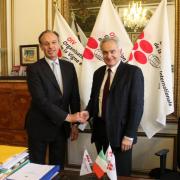
Mr Aurand took this opportunity to praise the excellent relationship between the Italian authorities and the OIV and the very valuable contribution made by experts from the Italian delegation in the OIV's scientific and technical groups, highlighting the fact that one of the four OIV commissions, the commission on economic and legal issues, is currently presided over by Prof. Eugenio Pomarici.
The Director General of the OIV also paid tribute to the contribution made by his predecessor, Federico Castellucci, to the Organisation, and shared the OIV's strategic axes for the next five years with the Italian Ambassador. H.E. Mr Checchia underlined the importance of the vitivinicultural sector for Italy and pledged his country's support in implementing these strategic objectives, which it played a key role in developing.
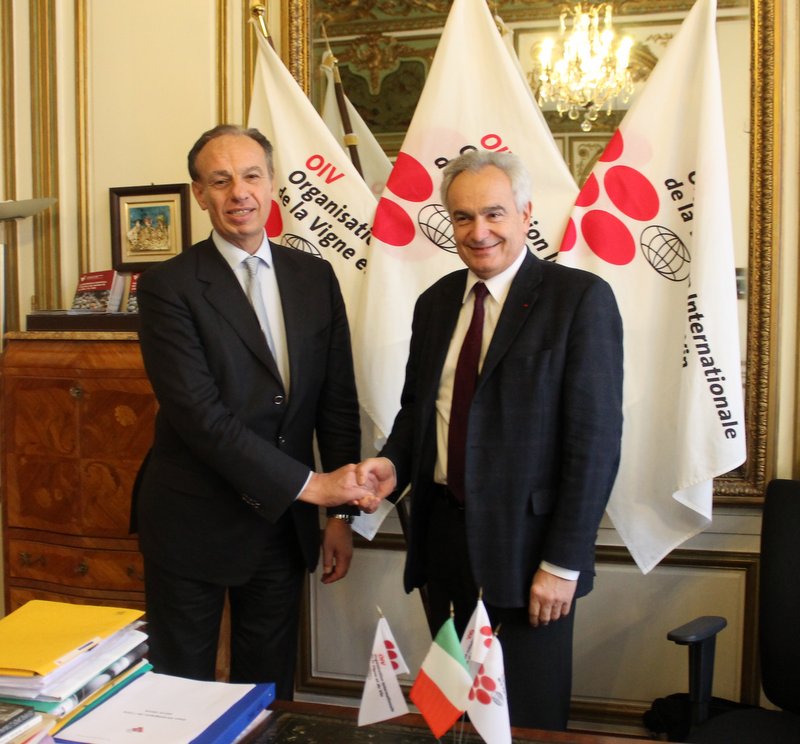

This acceleration is related not only to the globalisation of consumption, but also to the steady increase in the number of producing countries.
In this context, where competition is developing between countries, it is essential to define the characteristics of vitivinicultural products and their specifications, and to promote good regulatory practices in order to ensure fair trade and the integrity and sustainability of the various viticultural products on the world market.
It is important to meet the expectations of consumers in terms of product quality, protection of health and the environment and information on vitivinicultural products, while maintaining a sustainable world market for wine.
The OIV is uniquely positioned to provide wine producing and consuming countries with information to develop vitinicultural regulations that minimise barriers to trade, promote sustainable production and protect consumers. The OIV must ensure that its work is based on sound science. Therefore an ongoing review of OIV resolutions is an important aspect of the OIV work
There are considerable commercial, economic, environmental, territorial and societal challenges related to vine cultivation and vine-based products. The OIV should, provide its expertise and timely advice on these issues.

The Strategic Plan 2015-2019 aims to provide the best response to these different concerns. It is a continuation of the last Strategic Plan (2012-2014), during which approximately sixty recommendations including oenological practices, methods of analysis and viticulture recommendations were evaluated by a community of international experts and adopted by the Member Countries. New categories of vitivinicultural products along with their presentation rules were also defined and adopted.
A genuine road map, the 2015-2019 five-year plan is structured around the following five strategic axes:
1.Promote sustainable vitiviniculture
Within the framework of vineyard development and evolutions of conventional vitiviniculture, the OIV aims to promote sustainable vitiviniculture. To do so, the OIV considers the challenge of climate change, characterizes and evaluates production methods of grapes, wine, other products and principles and analyses their economic efficiency, while considering corporate practices on social responsibility. The OIV protects and optimizes the use of natural resources and the sustainability of viticultural terroirs.
2.Establish the authenticity rules of vitivinicultural products and promote good regulatory practices
In order to categorize the vitivinicultural product, the OIV promotes principles of good regulatory practices and draws up recommendations on oenological practices and on methods of analysis. The OIV defines quality professional training courses of the sector.
3.Understand market trends and supply chain dynamics
Within the context of developing international trade in the wine sector and in order to understand whole-of-supply chain dynamics, the OIV will enhance its systems for exchanging information and statistical analysis and facilitates identification of markets trends across the value chain.
4.Contribute to the safety of the consumers and consider their expectations
Based on assessment and scientific opinions, the OIV participates to the food safety of vitivinicultural products. It evaluates innovative technologies and physiological and nutritional aspects related to the consumption of vitivinicultural products as well as socio-behavioural factors. The OIV aims also to ensure consistency in regard to traceability and labeling.
5.Strengthen international cooperation and OIV governance
As a world intergovernmental organisation the OIV fosters international cooperation and participation of States and Observers. The OIV facilitates and highlights scientific production through an adequate communication.
The 2015-2019 strategic plan is implemented in accordance with a work program annually adjustable adopted by the Executive Committee and to be developed by the various Commissions, sub-Commissions and groups of experts, scientific and technical committee.
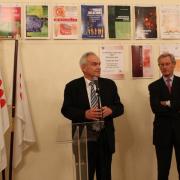
Mr Aurand summarised the events of 2014, his first year in office, highlighting the fact that "the OIV family has expanded, with the addition of our newest Member State, Armenia, which joined the organisation after Azerbaijan in 2013 and India in 2012. This growth shows that our Organisation is attractive and has a great image". Expressing his desire to negotiate more new memberships in 2015, the Director General reminded attendees that "our Member States currently represent almost 85% of global wine production and 80% of global wine consumption".
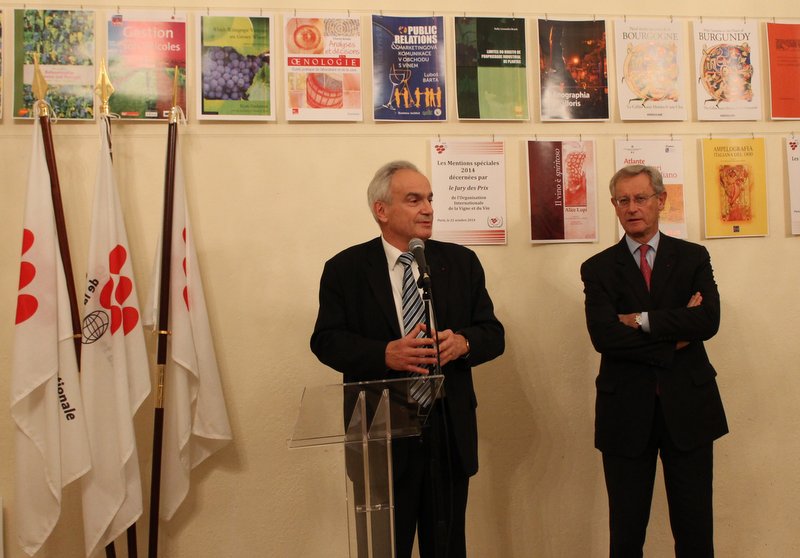
Jean-Marie Aurand then paid tribute to the success of the 37th World Congress of Vine and Wine, which took place in November 2014, in Mendoza, Argentina, calling it "a memorable congress, which boasted more than 1000 participants and in which more than 500 scientific papers were presented". The General Assembly of the OIV also formally adopted the 2015-2019 Strategic Plan, the Organisation's roadmap for the next five years. "This plan takes into consideration major developments in the vitivinicultural sector: an increasingly globalised and internationalised market (2 out of every 5 bottles of wine consumed globally are imported), growing competition and new expectations from consumers and the general public", the Director General explained.
In this context, "it is important to identify good practices and rules that preserve the stability and quality of products in order to ensure fair trade and to respond to consumer expectations in terms of product quality, health protection and transparency. This strategic plan also tackles new issues such as the impact of climate change and the promotion of sustainable viticulture" [2015-2019 Strategic Plan].
Another highlight identified by Jean-Marie Aurand concerned "efforts to improve and modernize the operation of the Organization. For example, OIV experts can now, for the first time, disseminate their presentations and studies via a scientific publisher, [OIV-EDP Sciences], while communications and presentations are being enhanced by the use of statistical data from the vitivinicultural sector".
The Director General of the OIV also reminded attendees that 2015 will see the election of a new president of the Organization, as well as new commission and sub-commission presidents, in Mainz, Germany, where the next OIV congress will take place on July 5th - 10th. He noted that the call for scientific papers for the congress had been launched and promised to be a great success [38th World Congress of Vine and Wine]. He also announced the redesign of the OIV website and the modernization of its IT systems.
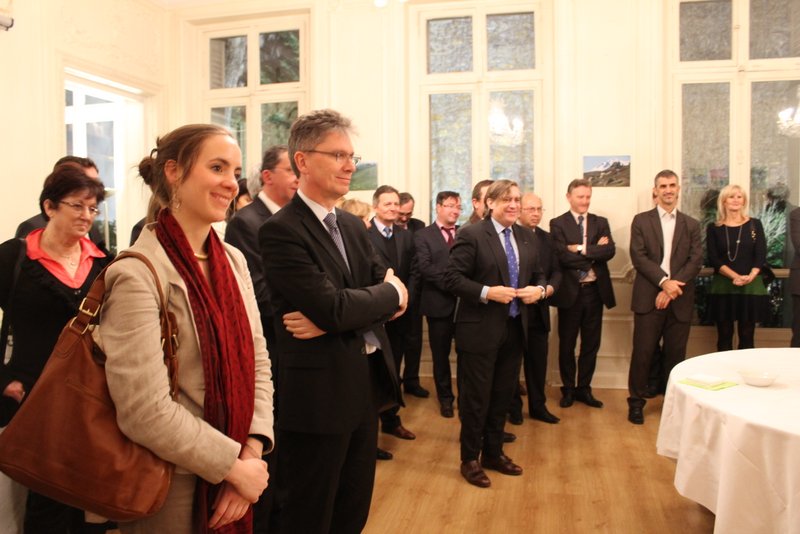
Finally, Jean-Marie Aurand welcomed the experts who will be attending the upcoming meetings in Paris in April to implement the 2015 work program, which he said promises to be rich and ambitious. He underlined the quality of their work and thanked them for their active involvement.
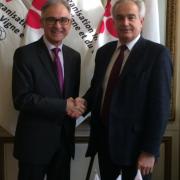
Mainly based on hybrids such as Solaris, Hibernal or Maréchal Foch, viticulture is growing in the region of Zielona Góra, as well as in the west of the country, in Wroc?aw in the south-west, in Krakow in the south, in the region of Podkarpacie and in Kazimierz Dolny in the south-east. In addition, consumption has also increased over the past few years, going from 1.4 litres to 2.4 per capita.
After recalling the objectives and missions of the OIV, Mr Jean-Marie Aurand stressed the benefits of joining the large OIV family for Poland, both as a producing country with specific climate conditions and as a consuming country increasingly interested in wine culture.
The Polish Ambassador indicated that he would engage in the necessary discussions with the Polish Minister for Agriculture so that the possibility of OIV membership can be considered as soon as possible.
